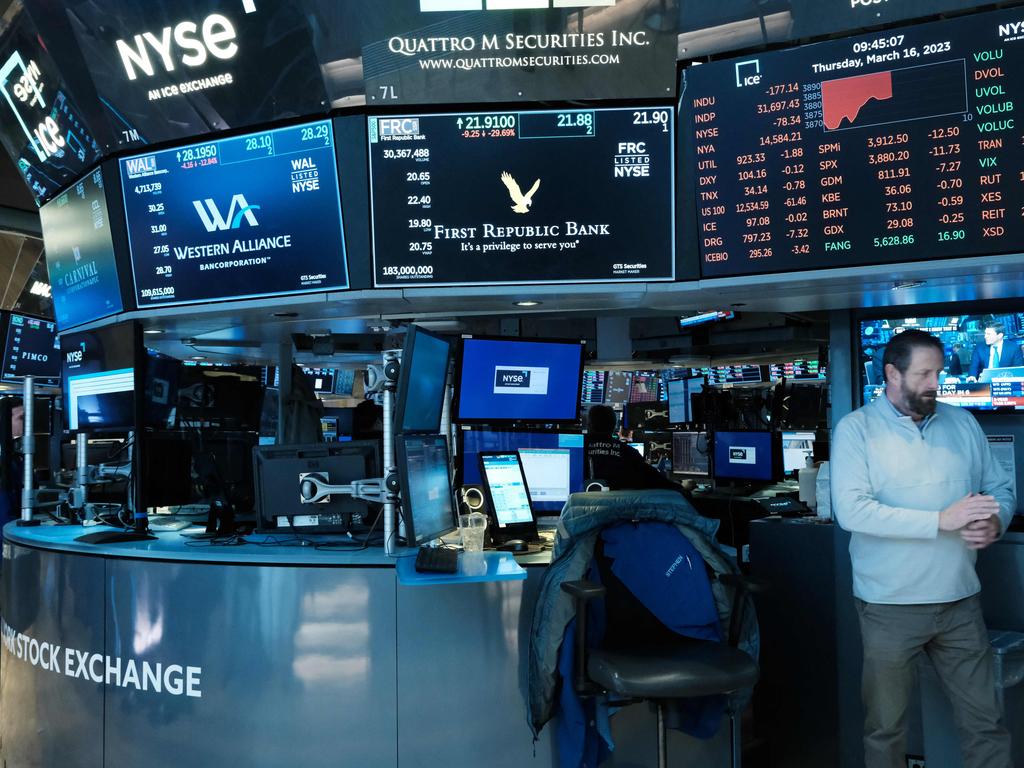UBS agrees to buy Credit Suisse for $US3bn
The deal between the twin pillars of Swiss finance is the first megamerger of systemically important global banks since the 2008 financial crisis.

UBS Group agreed to take over its longtime rival Credit Suisse Group for more than $US3bn ($A4.5bn), pushed into the biggest banking deal in years by regulators eager to halt a dangerous decline in confidence in the global banking system.
The deal between the twin pillars of Swiss finance is the first megamerger of systemically important global banks since the 2008 financial crisis when institutions across the banking landscape were carved up and matched with rivals, often at the behest of regulators.
The Swiss government said it would provide more than $US9bn to backstop some losses that UBS may incur by taking over Credit Suisse. The Swiss National Bank also provided more than $US100bn of liquidity to UBS to help facilitate the deal.
At a press conference, Swiss president Alain Berset confirmed the deal had been reached. The deal was the “best solution” to restore confidence, Mr Berset told reporters.
Swiss authorities were under pressure to make the deal happen before Asian markets opened for the week. They had to walk a fine line, needing to get the two banks’ boards to agree to the deal and avoiding the alternative, a regulator-led winddown of Credit Suisse, which could have proven more protracted and painful for the financial system.
The urgency on the part of regulators was prompted by an increasingly dire outlook at Credit Suisse, according to one of the people familiar with the matter. The bank faced as much as $US10bn in customer outflows a day last week, this person said.
The sudden collapse of Silicon Valley Bank earlier this month prompted investors globally to scour for weak spots in the financial system. Credit Suisse was already first on many lists of troubled institutions, weakened by years of self-inflicted scandals and trading losses.
Its stock price and bonds in free fall, Credit Suisse took a $US54bn lifeline from the Swiss National Bank last Thursday, which bought it enough time to enter the weekend intact.
But Swiss officials, along with regulators in the US, UK and European Union, who all oversee parts of the bank, feared it would become insolvent this week if not dealt with, and they were concerned crumbling confidence could spread to other banks.
Finma, Switzerland’s financial regulator, said Credit Suisse experienced a “crisis of confidence.” It added that there was “a risk of the bank becoming illiquid, even if it remained solvent, and it was necessary for the authorities to take action in order to prevent serious damage to the Swiss and international financial markets.” Finma said that operations of the banks would open normally on Monday “with no restrictions or interruptions.”
An end to Credit Suisse’s nearly 167-year run marks one of the most significant moments in the banking world since the last financial crisis. It also represents a new global dimension of damage from a banking storm started with the sudden collapse of Silicon Valley Bank earlier this month.
Unlike Silicon Valley Bank, whose business was concentrated in a single geographic area and industry, Credit Suisse is a global player despite recent efforts to reduce its sprawl and curb riskier activities such as lending to hedge funds.
Credit Suisse had a half-trillion-dollar balance sheet and around 50,000 employees at the end of 2022, including more than 16,000 in Switzerland. It has investment banking units in cities including New York, London and Singapore, an operations hub near Raleigh, North Caroline and employs thousands in technology in India and Poland.
UBS has around 74,000 employees globally. It has a balance sheet roughly twice as large, at $US1.1 trillion in total assets. After swallowing Credit Suisse, UBS’s balance sheet will rival Goldman Sachs Group and Deutsche Bank in asset size.
Like UBS, Credit Suisse is one of the leading managers of money for the global elite. It was consistently ranked among the top 10 in investment banks until the past year. It stumbled badly after the 2021 collapses of two key clients, Greensill Capital and Archegos Capital Management.
Credit Suisse is advised by Centerview Partners. UBS’s financial advisers are JPMorgan Chase & Co and Morgan Stanley.
The Wall Street Journal







To join the conversation, please log in. Don't have an account? Register
Join the conversation, you are commenting as Logout